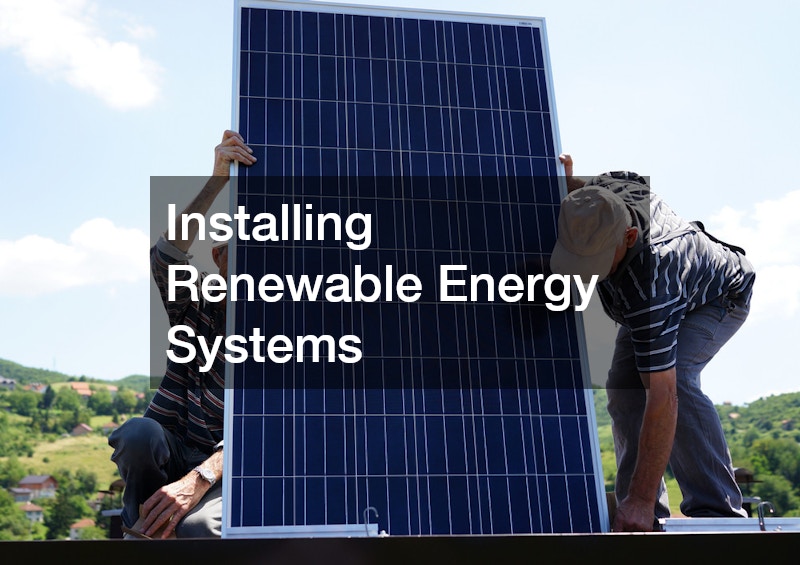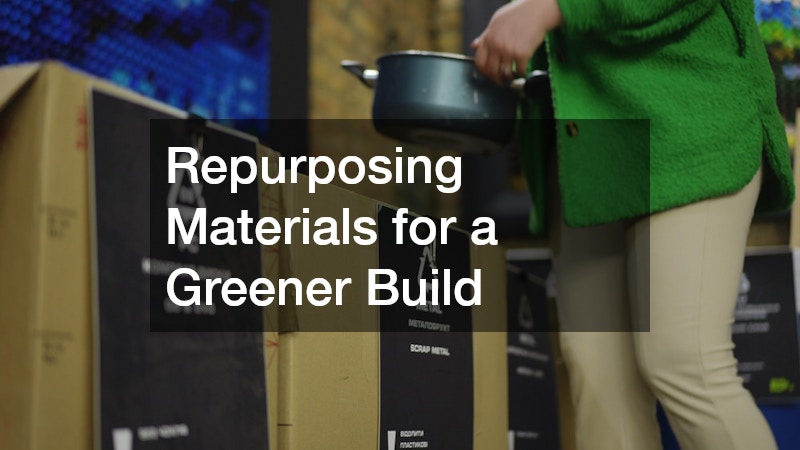Concerns about environmental impact and energy consumption continue to rise, so more homeowners are turning to sustainable home solutions. Green building practices and eco-conscious renovations are no longer niche trends—they are becoming essential approaches to modern living. Eco friendly housing projects focus on reducing carbon footprints, minimizing waste, conserving water, and enhancing energy efficiency. These efforts contribute to a healthier planet and lead to long-term cost savings and improved quality of life for residents. From city dwellers to rural homeowners, people across all regions are recognizing the urgency and value of building smarter, greener homes.
From energy systems and water conservation to sustainable materials and responsible landscaping, a green home considers every element of the building process. Whether you’re planning a major remodel or starting from scratch, incorporating environmentally conscious choices into your design can make a meaningful difference. In this blog, we’ll explore some of the most impactful eco friendly housing projects homeowners can pursue today to live more sustainably and responsibly. Each project offers opportunities to reduce your environmental footprint without compromising on comfort, aesthetics, or functionality.
Installing Renewable Energy Systems

One of the most effective ways to reduce a home’s reliance on fossil fuels is by generating clean, renewable energy on-site. Solar energy systems offer a highly sustainable and increasingly accessible solution, allowing homeowners to harness power from the sun and decrease their utility bills over time. While solar panels are often the first thing that comes to mind, innovations in solar roofing are making it easier than ever to integrate this technology seamlessly into the structure of a home. These systems can significantly cut greenhouse gas emissions, increase property value, and contribute to energy independence. As installation costs drop and tax incentives increase, solar technologies become a smart investment for new builds and remodels.
For homeowners committed to eco friendly housing projects, choosing solar roofing offers both functional and aesthetic benefits. Rather than mounting bulky panels on top of existing shingles, solar roofing systems are designed to replace traditional roofing materials entirely, blending in with the home’s exterior while delivering powerful energy output. When professionally installed and maintained, they provide a long-lasting solution that supports a greener lifestyle without sacrificing style or durability. Regular inspections and performance monitoring can further optimize the return on investment and ensure long-term reliability.
Conserving Water Through Smarter Access
Access to clean, reliable water is a cornerstone of any sustainable home. In areas where municipal water systems are overburdened or costly, drilling a private well can offer both environmental and economic advantages. Groundwater is a renewable resource when appropriately managed, and using well water can reduce strain on public utilities while giving homeowners greater control over water usage and quality. Integrating this system into a home’s sustainability strategy helps conserve resources and supports off-grid capabilities. Choosing the right site for a well is crucial, especially in regions with varied geology or limited aquifer access.
Working with a water well driller ensures that the well is placed and constructed properly to meet both environmental regulations and household needs. A licensed professional will evaluate soil conditions, determine the appropriate depth, and install pumps and filtration systems that align with the home’s water demand. Including a private well in your eco friendly housing project plan is a practical step toward self-sufficiency and long-term resource conservation. Many well drillers also offer ongoing maintenance services to help preserve water quality and avoid costly issues down the road.
Upgrading to Efficient Water Infrastructure
Water conservation is a key element of sustainable home design, and upgrading outdated plumbing systems is one of the most impactful changes a homeowner can make. Inefficient fixtures and aging pipes can waste thousands of gallons of water annually, while contributing to higher energy costs and unnecessary strain on local water supplies. Modern plumbing infrastructure focuses on low-flow fixtures, energy-efficient water heaters, and smart leak detection systems designed to use less water without sacrificing comfort or performance. Upgrades like recirculating pumps can also minimize the time it takes for hot water to reach faucets, cutting further waste.
To ensure these systems are installed and maintained correctly, working with experienced plumbers is essential. From installing low-flow toilets and showerheads to retrofitting entire water lines with sustainable materials, professional plumbers can optimize the home’s water usage while minimizing waste. Including these upgrades in your eco friendly housing projects can dramatically lower your water footprint and improve your home’s overall efficiency. In addition, modern plumbing solutions often qualify for rebates or tax incentives, offering even more reasons to make the switch.
Supporting Electric Vehicle Integration

Electric vehicles (EVs) are becoming a cornerstone of the green living movement, and integrating their infrastructure at home is a forward-thinking choice. Charging an EV from your home rather than relying solely on public stations offers convenience, cost savings, and control over how your vehicle is powered, especially if paired with a renewable energy source like solar. Creating a home environment that supports electric mobility is a natural extension of sustainable living. This integration also helps reduce the overall strain on public infrastructure and supports a broader transition to clean transportation.
Installing an EV charger at home makes it easier for homeowners to transition away from fossil fuels while supporting long-term energy goals. Smart charging stations can be programmed to operate during off-peak hours or to draw power only from renewable sources, depending on how your system is configured. Including EV charging capabilities in your eco friendly housing projects helps reduce overall emissions and future-proofs your home for evolving technology. These systems can also increase the resale value of your home as EV adoption continues to grow.
Ensuring Backup Power for Sustainability
Sustainable living also means preparing for emergencies in a way that doesn’t compromise environmental values. In many regions, power outages due to storms, fires, or grid failures are becoming more common. Having a reliable backup power source allows homeowners to maintain essential systems like refrigeration, lighting, and climate control without relying on traditional energy sources. When chosen carefully, backup systems can support renewable goals by using cleaner fuel types or integrating with solar setups. Many systems now offer app-based controls and remote diagnostics, making them even more user-friendly.
A well-chosen generator can be strategic in your home’s resilience plan. For eco-minded homeowners, modern inverter or dual-fuel generators offer more efficient, lower-emission options that can be tailored to power only critical systems, reducing unnecessary energy use. Adding this component to your eco friendly housing projects helps ensure sustainability and security go hand in hand. With proper maintenance and integration into your energy strategy, backup generators can be invaluable for environmental and practical preparedness.
Enhancing Home Safety with Professional Wiring
As homes become more energy efficient and technologically advanced, the electrical systems that support them must also evolve. Modern green homes often integrate solar panels, EV chargers, energy-efficient appliances, and smart systems that all require safe, reliable power distribution. Ensuring that wiring, circuit panels, and load capacities can handle these modern demands is critical, not only for functionality but also for the safety and long-term performance of the home. Without proper upgrades, outdated systems can lead to energy waste or dangerous overloads.
Partnering with certified electricians ensures that all installations meet code requirements and are designed efficiently. These professionals can assess your current system, recommend energy-saving upgrades, and ensure everything from lighting to major appliances operates safely and efficiently. Including a professional electrical audit and upgrades in your eco friendly housing projects provides peace of mind while supporting your home’s sustainable infrastructure. Regular inspections can also catch issues early, helping you avoid costly repairs and energy losses.
Repurposing Materials for a Greener Build

One of the most overlooked aspects of green building is what happens to construction waste. Tons of metal, wood, and other materials are discarded during renovations and new builds, much of which can be recycled or reused. Repurposing scrap metal reduces the demand for new raw materials, conserves energy, and keeps waste out of landfills. Sustainable homes start not just with how they are built, but also with how responsibly they’re cleaned up. Reducing debris and reusing materials can significantly lower the environmental footprint of any construction project.
Working with scrap metal recyclers allows homeowners and builders to manage waste in an environmentally responsible way. These professionals can collect and process leftover materials like pipes, roofing, and appliances for reuse, giving old metal a new life in future construction or manufacturing. Choosing recycling over disposal in your eco friendly housing projects adds an important layer of environmental responsibility and can often reduce cleanup costs. Many recyclers even offer pickup services, making the process convenient and efficient.
Choosing Sustainable Interior Solutions
Interior design is just as important as construction when it comes to sustainability. The materials you bring into your home, substantial, long-lasting items like sofas, tables, and cabinetry, can significantly impact your home’s environmental footprint. Opting for sustainably sourced, non-toxic, and durable products supports healthier indoor air quality, reduces landfill waste, and often means fewer replacements. Beyond materials, these items’ production and shipping processes also play a role in your home’s overall impact.
Selecting eco-conscious furniture made from reclaimed wood, natural fibers, or certified sustainable sources helps align your design with your environmental goals. Many manufacturers now offer collections that prioritize ethical sourcing and low-emission finishes, making finding stylish options that support your values easier. Making mindful choices in interior design as part of your eco friendly housing projects ensures that sustainability extends into every corner of your living space. Investing in timeless, quality pieces can also minimize the need for frequent updates, reducing consumption over time.
Maintaining Sustainable Outdoor Spaces
Landscaping plays a vital role in a home’s overall sustainability. Well-managed outdoor spaces can reduce erosion, support native wildlife, and provide natural shade that improves energy efficiency. Trees, in particular, offer long-term environmental benefits such as air purification, carbon capture, and stormwater management. However, proper care and maintenance are essential to keep them healthy and safe. Neglected trees can become liabilities, especially during storms or drought conditions.
Hiring professional tree services can help ensure your landscape remains an asset to your green home rather than a hazard. From pruning overgrown branches to removing invasive species and planting native varieties, these experts help you cultivate a sustainable, low-maintenance yard. Incorporating tree care into your eco friendly housing projects supports environmental health and enhances the beauty and function of your property. Thoughtful landscaping can also improve property value and foster community biodiversity.
Managing Wastewater the Green Way

Sustainable water management doesn’t stop at the faucet—it continues through disposal and treatment. Septic solutions offer a self-contained and environmentally friendly alternative for homes not connected to municipal sewer systems. Modern septic systems can treat wastewater effectively while minimizing pollution and supporting groundwater recharge when properly maintained. These systems can also reduce infrastructure costs for rural properties and contribute to decentralized water resilience.
Scheduling regular septic services is essential to keeping your system running efficiently and preventing costly and potentially hazardous backups or leaks. These services include inspections, pumping, and repairs that ensure your home’s wastewater is treated responsibly. Adding septic maintenance to your eco-friendly housing projects checklist is a proactive way to protect both your home and the environment. A well-functioning septic system also promotes a healthier landscape by preventing nutrient runoff and contamination.
Building or renovating a sustainable home is about more than using a few green materials—it’s about adopting a holistic mindset that prioritizes environmental responsibility at every step. Each decision contributes to a healthier, more efficient living space, from renewable energy and water conservation to thoughtful interior choices and responsible waste management. These changes reduce your home’s ecological impact and offer long-term financial benefits and a higher quality of life. A commitment to green living helps ensure that future generations will have access to clean air, water, and resources.
By partnering with knowledgeable professionals and incorporating eco-conscious systems and practices, you can transform your house into a model of modern sustainability. Whether you’re starting a new build or upgrading an existing property, investing in eco friendly housing projects means making a meaningful impact on your home, your community, and the planet. With the right planning and execution, sustainability can be seamlessly integrated into every aspect of homeownership—proving that responsible living is both achievable and rewarding.

